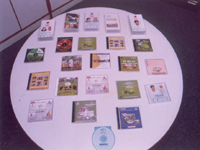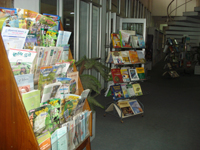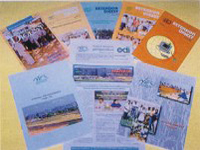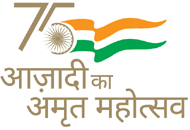



Extension Digest - 1997

March 1997, Theme: Integrated Pest Management, Vol. 5(1)
Abstract
The growing awareness of the adverse impact of indiscriminate pesticide use in agriculture has led to a shift towards eco-friendly practices in Pest Management.
Integrated Pest Management (IPM) strategies have been evolved which focus on an appropriate mix of practices, which not only regulate pest population but are also sustainable and non-polluting. The focus of this issue of the Digest is IPM strategies, experiences in India and other countries with IPM and how joint efforts among farmers, non-governmental organization and governmental organizations are helping replace chemical intensive farming with eco-friendly practices, around the globe.

July 1997, Theme: Partnerships, Vol. 5(2)
Abstract
More and more public and private Organizations,non-governmental organizations(NGOs),Universities and farmers groups are engaging in joint efforts to move towards sustainable agriculture.
Partnerships between research institutions ,extension agencies,non-governmental organizations and farmers have proved to be a viable alternative to the down approach for developing sustainable agriculture.Partnerships give the comparative advantage of all partner's and help in dealing with heterogeneity,finding solutions to location specific problems,and in synergy.
Some of the earlier issues of the Extension Digest have also focused on Partnerships under various themes.The current issue has focus on issues surrounding partnerships and documents experiences where different actors have found ways to forge partnerships leading to sustainable practices.

Oct 1997, Theme: Farming Systems Approach, Vol. 5(3)
Abstract
The Farming Systems Approach evolved because of increased awareness on the part of the researchers that farmers had a right to be involved in the process of technology development as they stood to gain or lose most from technology adoption.Moreover ,it was recognized that farmers could productively contribute to development of appropriate technology As they were aware of the complexity,diversity and variability of their farming systems.
The farm family functions with its limitations of capability and resources of which the scientist is not fully aware often leading the recommendations which are not appropriate to farmers needs.
This issue of the Extension Digest focuses on the farming systems approach to research,extension and development,documents some successes and ways of monitoring and ensuring sustainability of farming systems.

Jan 1997, Theme: Managing Common Property resources, Vol. 4(4)
Abstract
Farmers often depend on natural resources beyond the farm,like,grazing land,forests,wasteland,waterbodies,rivers and banks.These Common Property Resources(CPR) comprise a sustainable part of the resource base of the economy and play a crucial role in providing goods and services to the rural population.Currently these natural resources are becoming scarce and degraded and it is necessary that these are managed properly and their productivity maintained sat a high level,Privatization and nationalization of CPRs,have been resorted to as solutions to arrest degradation.However,according to evidence,these have helped preserve the environment nor helped the poor gain control over their resources.Collective Management is now advocated as an appropriate strategy for managing CPRS,the argument being that effective arrangements can be developed only if they grow out of indigenous resource management practices and involve communities who depend on these resources.
This issue shows how rural communities organize the use of natural resources to ensure that they can continue to live off their land.






